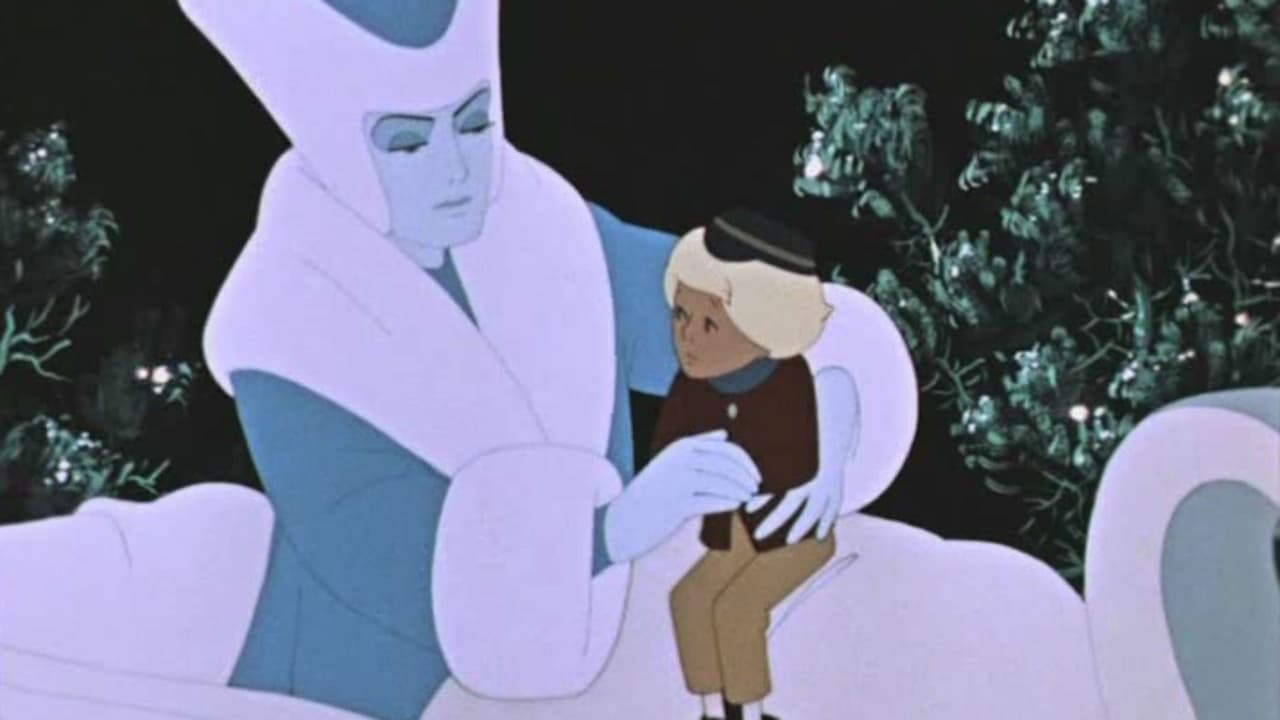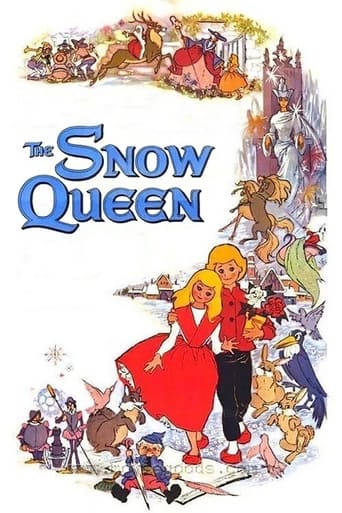


for a film who was the favorite one of childhood, it is not easy ( or fair ) to say anything. because it is a part from yourself. so, the only word could be, maybe, its virtue to be the best adaptation of Andersen fairy tale. not only for drawing or actors but for the way to use the story in a charming manner. for the delicacy and for the spirit of childhood. for the preserving joy of meet with the characters. for a Snow Queen who remains different by each other versions because her final silence is the most impressive way to define the essence of story. so, a lovely film. for the entire family.
... View MoreIn the 1950s and 60s, several Hollywood studios bought international films and re-dubbed them into English. In many cases they also cut the films to pieces and rearranged them in a sad attempt to make them more marketable. In EVERY case I can think of, the results left a lot to be desired. A few of these, such as the re-dubbing and reworking of "Godzilla" (where Raymond Burr seemed to be added rather randomly in order to 'Americanize' the action), worked well enough. But most were simply awful. The list of terribly dubbed stupid international films is very long indeed, with films like "Invaders from Space" and cartoons like "Alakazam the Great" and "Pinocchio in Outer Space". While "The Snow Queen" isn't as bad as the three films I just mentioned, it is pretty bad. Why is it so bad? Well, much of it is because when it comes to showing it to American kids of the day, the material is pretty dull stuff. And, with excellent Disney productions to compare it to from the same time period (such as "Sleeping Beauty" and "101 Dalmatians"), the film just comes up very, very short and the kids would have clearly demand Disney! The film begins with a prologue starring Art Linkletter and a bunch of not particularly talented kids (one who is named, I kid you not, 'Dick Johnson'- -so much for making this a family-friendly film). They are all enjoying a supposedly impromptu and TOTALLY SCRIPTED Christmas morning. You wonder WHO all these kids are and WHY are they at Linkletter's home and WHERE are the parents!! It's all done in an attempt to legitimize the film which follows. In other words, back in the late 50s, Linkletter was a beloved American TV star...and if HE loved the film, it must be good...right?! Well, no. I just assume that Universal Studio paid him a gob of cash to hang out with the kids and promote a crappy Soviet cartoon. As for this Russian film, it's well animated compared to some films of the day (by the late 50s, standards in animation were dropping world-wide). Not as good as Disney, but not bad for the day. Sure, the humans often had creepy expressions but again I make allowances for this because of the period in which it was made. The story is about the Snow Queen from Hans Christian Andersen. It's actually a lot closer to his story than the recent Disney film "Frozen", though I doubt if many folks will really care. The story is about two adorable (?) kids who love each other--Kay (a boy) and Gerta. Unfortunately for them, Kay makes a mistake of making fun of the Snow Queen and she responds by hardening his heart and making him a total jerk towards poor Gerta. Then, the Queen steals the boy and takes him to her frozen kingdom to be her friend. As for Gerta (and this is the ONLY thing I really liked about the film), she wasn't about to stay back home and cry--she set out on a long adventure to get her beloved Kay. The path leads to many adventures (some involving nice fairy tale creatures and some involving fairy tale jerks) and eventually Gerta's persistence is rewarded. In many ways, it reminds me of the wonderful children's book "The Paper Bag Princess" but is so dull and heavy-handed that its great message is lost because the film is so charmless. The bottom line is that I cannot see many kids enjoying this. Younger ones especially will squirm in their seats if they're made to watch this one and older ones simply will wonder why they didn't just watch something else. You should definitely consider seeing something else.
... View MoreThis adaptation of The Snow Queen is likely the most well-known animated film from Russia and rightfully so. It's a beautiful film with a lovely color palette and interesting character animation. Unlike the recent musical-comedy Frozen (2013), this is more faithful to the original Hans Christian Andersen fairy tale and the central bond between Gerda and Kay feels comes across as much more poignant than anything in the later film, as Gerda goes through hellish scenarios for Kay's sake.Unfortunately, the ending dilutes the emotion of the story. (SPOILER WARNING) Once Gerda makes it to the Snow Queen's palace and finds Kay, the confrontation with the titular character is less than convincing. Gerda simply shouts, "Go away!" and the mildly agitated queen disappears, leaving the children to make their way home and live happily ever after.Now I was not expecting a ridiculous battle for the climax, but I felt it could have been handled with more power, with Kay forced to pick between the safe but soulless domain of the Snow Queen and Gerda's love. It would have been more satisfying. Or they could have kept the original ending too. Either of these would have been better than what was chosen. I'm not the only one who feels this way either; even director Hayao Miyazaki expressed his displeasure with this film's finale in an interview.Still, this is among the better adaptations of the fairy tale to date and classic animation fans should not miss out.
... View Morefor one who discovers it in childhood and believes, after years, that it is a splendid gift for soul, another definition is impossible. because it is not an adaptation. only a delicate delight. innocent, subtle, fresh, adorable. it is a meeting. with a fairy tale but, more important, with a art of cartoon. it is a magic occasion to understand a world. very fragile, almost dark, strange and in a way, cold. four years after Stalin, a year after Ungaria intervention. and this basis makes it profound and essential. like an adventure of spirit. like testimony of a form of resistance against evil. so, it is not exactly an adaptation. maybe, a parable. this is its secret. secret of the art to remain a delight. secret to be , at every age, a isle of peace and joy.
... View More